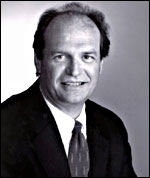 |
 |
 |
| HOME | McCaw Hall | Timelines | Events |
|
Sunday, June 22, 2003 By Melinda Bargreen
What we won't know until June 28 is what the hall will sound like. Acoustics, that fascinating blend of art and science, are the make-or-break element of any performance hall. No matter how beautiful everything else may be, if the acoustics aren't good, the hall is a failure.
That fact may be keeping a lot of people awake at night, and the McCaw Hall acousticians — Russell Cooper and Mark Holden — admit they're "waiting with anxious held breath" for opening night, Holden says.
The acousticians began by making extensive acoustical measurements in the Opera House before the reconstruction, placing a binaural (two ears) measuring device that looks like a human torso in many different seats during an actual opera production. The results were recorded to digital tape and analyzed to get a diagnostic "signature" of the hall. "The Opera House was quite similar to a number of other large halls, like the Metropolitan Opera House, Kennedy Center, San Francisco (War Memorial Opera House) and Houston (Wortham Theatre Center). They're what you'd call American-sized halls, not like the smaller halls of La Scala and Vienna," Holden explained. One area where the sound was noticeably deficient was just in front of the old balcony on the orchestra (main) floor. Cooper thinks this may have been caused by an overhead catwalk that blocked sound reflections. That catwalk has been changed substantially, and the stage opening (the proscenium) also has been raised from 30 to 40 feet. The basic structure of the hall hasn't been changed that much, Holden observes: "The balconies are more or less the same, the ceiling is still there, and the orchestra pit is not hugely changed. You can see the old wall through the balcony boxes in the upper gallery. But the sloping seating areas on the sides of the orchestra level and the boxes have narrowed the room, which is good. There will be more of a feeling of intimacy." Unlike many modern halls, such as Philadelphia's Kimmel Center, McCaw Hall won't have variable panels to turn this way or that. What Holden feels is an important variable is the placement of the orchestra in the orchestra pit: "I hope to have some opportunity to work with the orchestra beforehand. Music directors usually spend very little time moving the instruments around, but it can make a huge difference whether the French horns are on the right or the left or beneath the overhang." The Seattle acoustical firm of Michael Yantis and Associates also is a major player in the hall's creation, serving as "eyes and ears" in Seattle and designing the acoustics of the smaller lecture hall. So where would Holden and Cooper sit, if they were buying tickets to McCaw Hall? In the first or second row of the balcony or mezzanine. There, you'll have what Holden calls "very clear and present sound, with some envelopment, and you're above the pit and should hear the instruments well." At least, we hope so. Seattle Opera's general director Speight Jenkins is only half kidding when he promised Holden: "Look, you tell me you're going to give me better acoustics — great. All I want is the same ones. But if they're worse, I'm going to chase you all over Connecticut with a hatchet."
|
|
||||||||||||||
seattletimes.com home
Home delivery
| Contact us
| Search archive
| Site map
| Low-graphic
NWclassifieds
| NWsource
| Advertising info
| The Seattle Times Company
